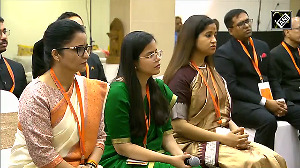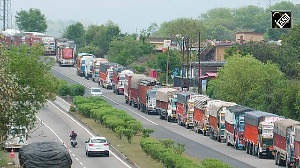 Strategic mistakes I made in India? Where do I begin? Seriously, though, a lot of our India strategy is based on our trial-and-error experiences here.
Strategic mistakes I made in India? Where do I begin? Seriously, though, a lot of our India strategy is based on our trial-and-error experiences here.
Like other multinationals, we've also been guilty of misjudging the Indian market at times. I came to India in February 1998 and we launched Amway India with six products in May that year.
Initially, we set up a distribution system that was parallel to what Amway uses in other countries. That means essentially home delivery of products that are ordered by customers either through the Internet or on telephone.
The products are reached to the customers' doorsteps within 24 to 48 hours of the order being placed.
We were fairly confident that the same organisational set-up would work in India as well. Accordingly, we began with just five offices, in the main metros.
We assumed these would work as pick-up centres, with just a few consumers coming in to pick up products. In fact, we had factored that just 20 per cent of our sales would be through counter sales and 80 per cent would be through the home delivery route.
It took just a couple of weeks to prove how wrong we were in our assumptions. We discovered that people wanted to come into the stores, see the products, pick up and touch them before they purchased anything. Home delivery just didn't interest them.
We now have 48 pick-up centres and close to 30 local ordering centres, which are located in smaller towns. We've realised the importance customers place on having contact with people from the company.
The other learning from that and subsequent experiences is that a 'one-size-fits-all' strategy won't be successful in India. We have a portfolio of 450 products that are all available in one size each.
Except in India, that is. We realised from our early experiences in India that customers want to experience the products before they make a purchase decision -- hence the need for more stores.
Similarly, Indians don't like to economy-size packs until they've tried the product earlier. Accordingly, we launched our cleaning and personal care products in various sizes -- big, medium, small and even sachets.
That's a first for Amway worldwide, but the different price points encourage different types of users. We've also been more aggressive promotionally in India than in other countries.
All of which are unlike our strategies in other markets across the world. As a 50-year-old company, it is easy to become set in your ways. You end up trying to duplicate your other successes in new markets as well.
But to believe that old successes will drive new ones and to not change your ways -- an attitude that says "this is how we will do it because this is how we've always done it" -- is wrong.
We have realised that you need to adapt to the market -- the market won't adapt to you.
But perhaps one of the biggest mistakes I made in my career was in significantly underestimating the partnership between the corporation and Amway independent business owners (those who directly sell the company's products).
In the corporate sense, we do everything a business does -- we manufacture products and sell them. But the reality is that these products are sold by independent distributors. And we were making too many important decisions without considering the viewpoints of these people.
We were trying to do what we thought would be good for them, without taking into consideration what they knew would be good for them. And if a decision is not entrepreneurially right, it cannot be right for the business. If you can't get your partners to buy into your vision, you're doomed.
We learnt this the hard way about five years ago when Amway announced a promotional offer where we reduced the price on one of our cleaning products. The promotion was hugely successful, but after it ended there were some negative repercussions.
What happened was this: we reduced the price and even printed the lower price on the package. But nowhere did we mention that this was a limited-period promotional offer. Existing buyers would, naturally, be aware of the change in prices.
But after the promotion, when the distributors approached first-time buyers to resell the cleaning product, they thought we'd hiked prices! If we had taken feedback from the distributors before launching the product, we would have realised the need to emphasise the promotional nature of the lowered prices in a way that would be clearly known and remembered.
We realised that we hadn't looked at the promotion from the point of view of the person who actually sells the product.
The learning? It doesn't matter how smart you are and how many degrees you have. People always see issues from their own perspective, not yours.
William S Pinckney is Managing Director and CEO, Amway India.
As told to Meenakshi Radhakrishnan-Swami.








 © 2025
© 2025